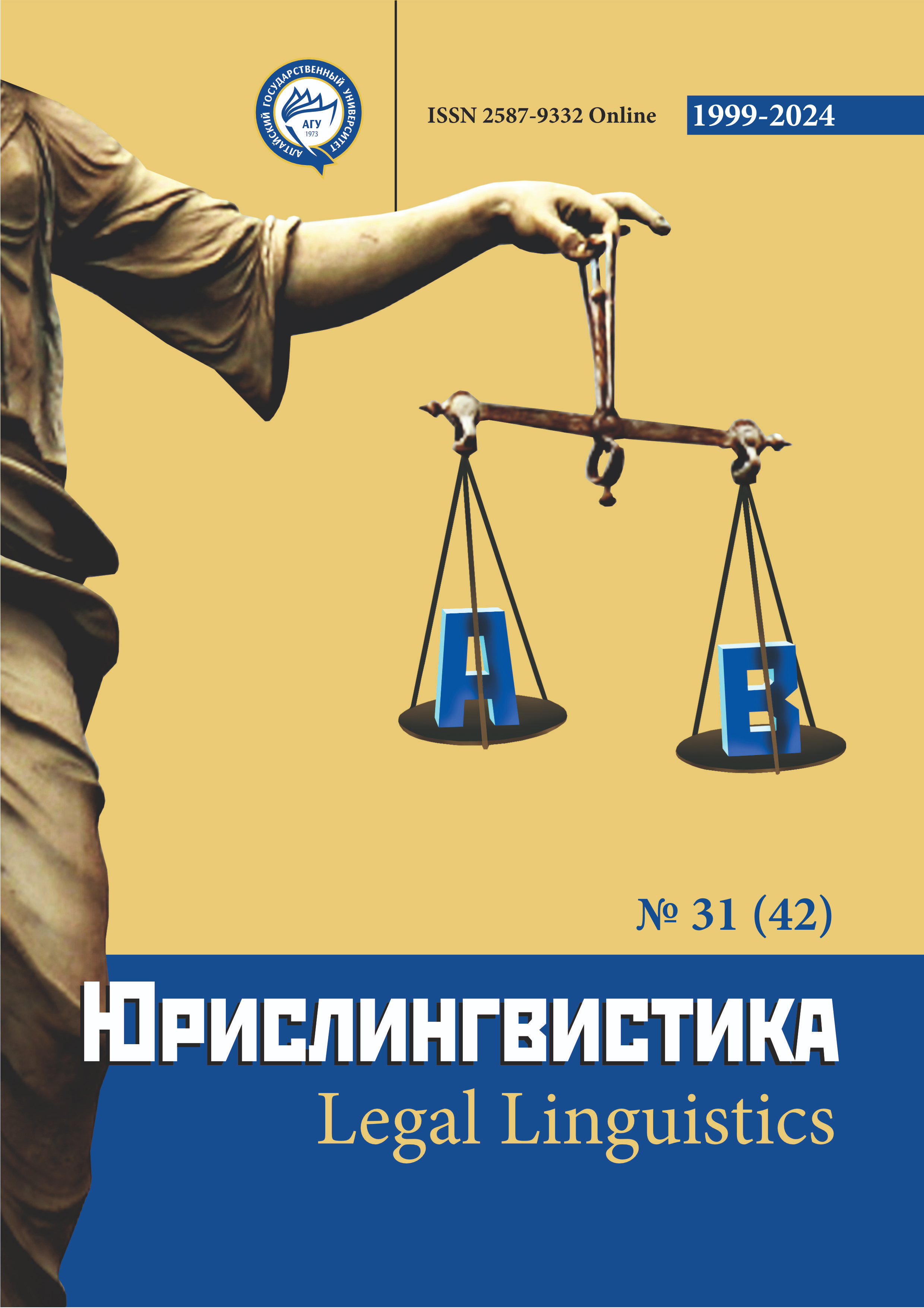Sensitive Topics Related to LGBT Propaganda in Respect of Current Legislation
УДК 340.132.6, ББК 67.0
Abstract
The article examines the issue of discussing sensitive topics in the context of modern laws on LGBT propaganda. The study discusses identifying the characteristics of a text that does not contradict various ideas about linguistic security. During the study, an analysis of current legislation in this field is carried out, on the basis of which methodological recommendations for authors are also developed. Particular attention is paid to defining text security criteria for all participants in media communication, as well as clarifying certain aspects in accordance with existing regulations. The legal norms are studied in the article in the context of general trends in modern legislation dedicated to the preservation of traditional family values. When drawing up methodological recommendations, the results of a comparative analysis of the text of new articles of the Code of Administrative Offenses of the Russian Federation with their previous versions are also taken into account. Through a detailed analysis of the texts of Articles 6.21 and 6.21.2 of the Code, the system of concepts of the designated articles of the law is reconstructed, which is further used when identifying markers of statements that threaten the safety of participants in communication. Based on all the aspects above, in the conclusion the author states criteria for sensitive content in the field of LGBT propaganda and presents the results of the research in the form of recommendations.
Downloads
Metrics
References
Isidoros P., Loizos. M. Sensitive Content Recognition in Social Interaction Messages. 2023. URL: https://www.researchgate.net/publication/371970183_Sensitive_Content_Recognition_in_Social_Interaction_Messages
Tripathi R., Dhamodharaswamy B., Jagannathan S., Nandi A. Detecting Sensitive Content in Spoken Language. IEEE International Conference on Data Science and Advanced Analytics (DSAA). 2019. URL: https://doi.org/10.1109/DSAA.2019.00052
Дубровская Т. В. Судебный дискурс: речевое поведение судьи (на материале русского и английского языков). М., 2010.
Ефремова Т. Ф. Новый словарь русского языка. Толково-словообразовательный. URL: https://www.efremova.info/
Земляная Т. Б., Павлычева О. Н. Термин как носитель правовой информации / Журнал научно-педагогической информации. – 2010. – № 3. – С. 26–28.
Кордуэлл М. Психология. А - Я: Словарь-справочник / Пер. с англ. К. С. Ткаченко. М., 2000.
Мартынова Н. А. Выбор способов номинации при наименовании реалий правового дискурса / Ученые записки Орловского государственного университета. Серия: Гуманитарные социальные науки. – 2015. – № 6 (69). – С. 162-164.
Мартынова Н. А. Роль терминологической лексики в формировании коммуникативной компетенции специалиста / Общество и человек. – 2014. – № 1 (7). – С. 67-72.
Об утверждении Основ государственной политики по сохранению и укреплению традиционных российских духовно-нравственных ценностей: указ Президента РФ от 9 ноября 2022 г. № 809. URL: http://www.consultant.ru/document/cons_doc_LAW_430906/
Ожегов С. И. Толковый словарь русского языка. URL: https://slovarozhegova.ru/
Проект «Критерии оценки материалов и (или) информации, необходимых для принятия Федеральной службой по надзору в сфере связи, информационных технологий и массовых коммуникаций решений о включении доменных имен и (или) указателей страниц сайтов в информационно-телекоммуникационной сети «Интернет», а также сетевых адресов, позволяющих идентифицировать сайты в информационно-телекоммуникационной сети «Интернет», содержащие запрещенную информацию, в единую автоматизированную информационную систему «Единый реестр доменных имен, указателей страниц сайтов в информационно-телекоммуникационной сети «Интернет» и сетевых адресов, позволяющих идентифицировать сайты в информационно-телекоммуникационной сети «Интернет», содержащие информацию, распространение которой в Российской Федерации запрещено» URL: https://regulation.gov.ru/projects#departments=47&npa=134715
Толковый словарь русского языка / под ред. проф. Д. Н. Ушакова. URL: https://ushakovdictionary.ru/
Трофимова Г. Н. Лингвистическая безопасность: к проблеме толкования / Русистика. – 2012. – № 1. – С. 24-29.
Урматова А. Д. Термин как носитель специальной правовой информации / Таврический научный обозреватель. – 2017. – №2 (19). – С. 103-105.
Copyright (c) 2024 Ирина Онкина

This work is licensed under a Creative Commons Attribution 4.0 International License.
The authors, which are published in this journal, agree to the following conditions:
1. Authors retain the copyright to the work and transfer to the journal the right of the first publication along with the work, at the same time licensing it under the terms of the Creative Commons Attribution License, which allows others to distribute this work with the obligatory indication of the authorship of this work and a link to the original publication in this journal .
2. The authors retain the right to enter into separate, additional contractual agreements for the non-exclusive distribution of the version of the work published by this journal (for example, to place it in the university depository or to publish it in a book), with reference to the original publication in this journal.
3. Authors are allowed to post their work on the Internet (for example, in a university repository or on their personal website) before and during the review process of this journal, as this may lead to a productive discussion, as well as more links to this published work (See The Effect of Open Access).











